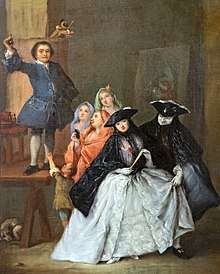charlatan

A charlatan is a person who pretends to have a certain knowledge or ability. As charlatanism the behavior or the will swindle called a charlatan.
Origin and history of the term
The origin of the term - frequent synonyms are Aufschneider , Schwindler , impostor - is assumed to be a fusion of the place name Cerreto and the Italian ciarlare ('chat') or ciarla ('chatter'). In the Middle Ages, the Cerretani , residents of the Italian town of Cerreto di Spoleto, had the bad reputation of roaming the area as trampers and pulling money out of their pockets from innocent people with jokes and frauds. Accordingly, the term charlatan soon became a synonym for all land-traveling people . In the 18th century traveling surgeons and star engravers were often expelled from the country because of charlatanism. B. John Taylor from Prussia or Joseph Hillmer , who operated at the Tsar's court in St. Petersburg, from Russia. They were accused of being political spies and agents and / or branded charlatans due to the high complication rate of their interventions.
The historian Johann Burckhardt Mencke latinized the popular term charlatan in his publication De Charlataneria Eruditorum ("Charlatanery of the Scholars") from 1713. This work was followed by a further series of special publications , namely on the charlatanry of doctors (1717 and 1719) , the clergy (1735) and the jurists (1742).
Pierer's Universal Lexicon in 1857 defined charlatan as someone who
“It knows how to get the semblance of erudition u. To give wisdom and tries to attract public attention by low means, especially a quack who announces himself by yelling at the market . A literary Ch. Is a writer who, without thorough studies, uses the work of others for plagiarism , etc. the opinion of the audience about their skills and Achievements know how to deceive. Hence Charlantanerie, Charlatanism ... "
Trivia
The opera Šarlatán by the Czech composer Pavel Haas was premiered in 1938; the literary model for forming Josef Winckler's novel about the time wrongly as charlatans or quacks decried Doctor Eisenbarth .
The figure of Mephistopheles in Goethe's Faust ( Urfaust and Faust I ) is satirically portrayed as a medical charlatan (disguised as a medicine professor).
literature
- Wilhelm Ebstein : charlatanism and quackery. Stuttgart 1905.
- Gregor Eisenhauer : charlatans. Eichborn Verlag , Frankfurt am Main 1994, ISBN 3-8218-4112-5 ( Die Other Bibliothek vol. 112).
- Grete de Francesco: The Charlatan. In: Ciba magazine, vol. 4, no. 37 (1936/37), pp. 1254-1281.
- Grete de Francesco : The Power of the Charlatan. Schwabe Verlag , Basel 1937.
- Heinrich Schipperges : The charlatan in the Arab and Latin Middle Ages. In: Bulletin of the International Society for the History of Pharmacy. Vol. 12, No. 2, 1960, pp. 9-13.
Web links
Individual evidence
- ↑ Scharlatan , duden.de, accessed on December 31, 2012
- ↑ Scharlatanerie in duden.de, accessed on December 31, 2012
- ↑ Scharlatan in the Etymological Dictionary according to Pfeifer; online at DWDS , accessed on December 31, 2012
- ^ Pierer's Universal Lexicon. Volume 3. Altenburg 1857, p. 870 ( online at zeno.org ).
- ↑ Frank Nager: The healing poet. Goethe and medicine. Artemis, Zurich / Munich 1990; 4th edition ibid. 1992, ISBN 3-7608-1043-8 , pp. 208-211 ( Mephisto - ancestor of Docteur Knox. )